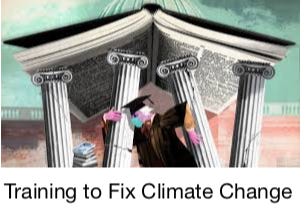The fires and extreme temperatures on the Left Coast have demonstrated that we are on the verge of an environmental catastrophe that can end the reign of humans on this planet. Meanwhile, total unemployment claims are over 12 million, and many more are out of work but are not in the unemployment insurance system. Many of those out of work have no jobs to which they can return. This article is about connecting the environmental crisis and the social crisis.
The COVID-19 Pandemic is fearsome enough to stop our daily routines and economic activities in their tracks, but no one expects the virus to wipe out all of humanity. But that is exactly what may befall us with rapid (in geological time) climate change. Many plants and animals can adapt to drastic climate changes when they are made over hundreds of years, but this time it’s coming on like a locomotive.
In the past 120 years, the average summer temperature in California has increased from 71.3 degrees to 75.4 (L.A. Times, 9/20/20) – an increase of 4.1 degrees Farenheit in little more than a century. In addition, this year the highest California temperature in history was recorded at 121 degrees in Woodland Hills on Sept. 6.

Wildfires have played havoc this summer throughout the Left Coast. Smoke from those fires, which sent the Air Quality Index over 500 (very hazardous) in some locations, has blanketed most of the country and is sweeping across Europe and North Africa.
The writing is on the wall. Climate change won’t wait until we get our act together. Drastic actions are called for as quickly as possible. If we don’t act, we can expect the end of the human race and the end of most mammals, plus many other species. Fortunately, it just so happens that with 20 million people out of work, we need a massive jobs program. On the downside, where are the heroes in important positions who will take up humanity’s greatest challenge?
President Trump doesn’t think there’s a problem, and Challenger Biden has not supported either of the two comprehensive environmental proposals that have reached Congress. They are H.R. 3671, Off (fossil fuels) Act, which has not been put to a vote even though it was introduced in 2017, and the Green New Deal, which is a resolution, not a piece of legislation, but which was endorsed by the House before being voted down in the Senate. Either, or both, of these would have to be reintroduced, or modified, when the newly elected Congress is seated in January.
Meanwhile, it appears that only mass action by the people will push politicians to act before it’s too late.

Elements of a Jobs Program
Some historians would say that World War II was a “jobs program” to end the depression that still plagued the United States. Of course, that wasn’t the only reason for the war. Likewise, an environmental jobs program could raise us out of the depression we’ve fallen into, and put everyone to work.
Defining the Goals
The main task of the jobs program is to reduce the amount of greenhouse gases the world puts into the atmosphere, which is currently 50 billion tons per year. The U.S. share of these emissions is around 7 percent. This is about 3.2 percent more than in 1990. Another important task would be to devise new ways to pull CO2 out of the atmosphere.
Since the U.S., along with China, are the major polluting countries, we must work in a cooperative fashion with all the other countries of the world. Like COVID, greenhouse gases do not respect national boundaries.
A jobs program should be aimed at the two tasks, above. If it is to have the most impact, it should focus on those sectors in the U.S. where emissions can be rapidly reduced: The use of energy accounts for 73.7 percent of all emissions. All sources of energy that are allowed should be renewable and non-polluting. This eliminates fossil fuels such as oil and coal, methane, biomass, and nuclear, at the least.

Solar for All
Solar and Wind Turbine installation should be increased. Hundreds of thousands of jobs could be created if there was a law requiring solar panels on all buildings, both residential and commercial. These jobs would be on production lines and installation. Thousands of engineers and scientists could be put to work increasing the efficiency of solar panels, which is now only in the 20-27 percentile range. Wind turbines need to be erected across the country to supplement solar energy.

Trains, not Planes
Aviation accounts for 1.9 percent of all pollutants and should be replaced by magnetic levitation (MagLev) trains, which are already in use in China and Japan. They can attain speeds of nearly 400 mph, not much slower than commercial airliners. Thousands more workers would be needed to put such a modern, speedy and safe system into operation throughout the country.
ICE is Melting Away
Internal Combustion Engines (ICE) used in cars and trucks account for 11.9 percent of greenhouse gases and should be easy to replace with electric-powered vehicles. Conversion of existing ICE vehicles would be cleaner than just building new cars and trucks. Currently, the conversions are done one at a time and are nearly as expensive as a new electric vehicle. However, if all of the old ICE factories had their assembly lines converted to a standard procedure, the cost could be drastically reduced. With a rebate for the engine and drivetrain, plus a government subsidy, and perhaps a leasing arrangement on the battery, the operation could be performed for next to nothing.
Fear Stalks the Land
Is this too much social change for the average person? Is the cost too high? It reminds me of the old Jack Benny joke in which he is held up at gunpoint. “Your money or your life,” says the gunman. Benny doesn’t say anything, until the robber finally says, “What’s it gonna be?” Benny responds, “I’m thinking, I’m thinking.”
Franklin D. Roosevelt didn’t have to stop and think when Japan attacked Hawaii and The Philippines, and Germany conquered most of Europe. The national debt ultimately increased to a mind-boggling 113 percent of GDP (Gross Domestic Product) during WWII, the highest in history. The U.S. was on the winning side, and didn’t even have to pay off the debt, since the economy was growing so fast. All of the suggestions in this article could stimulate the economy in a similar fashion, so in effect, the money is a sound investment in the future.

Free Tuition Can Save Us
Also, costly but necessary, is a crash program to train millions to have the needed skills to effectively fight climate change. Let’s create a national Climate Change University, with branches at every public college in the country. The courses of study would include environmental science, engineering, mechanics, agronomy, and many more skilled occupations. We could have one-year certificates, two-year certificates, BAs, MAs or PhDs, depending on the area of expertise. There should be no tuition or fees, and all students should receive a living wage.
One of the facts that we often lose sight of in the argument about tuition is that college graduates are a national resource, that is, they add much more value to the accumulated wealth of the country than it costs to pay for their education. One study found that a college graduate will earn nearly a million dollars more during his/her lifetime than will a high school graduate. This wage is only a part of the total wealth that is created. Left behind for the boss and Wall Street is the surplus value that was created. Added together, the new wealth realized from millions of people learning new skills and trades would give the country quite a boost. It makes no sense to keep students out of higher education.
Not all training and education would be technical. We need billions of trees planted in the U.S., and we need to extend aid to all other countries that can plant trees and other flora that will absorb large amounts of greenhouse gases. The recent forest fires have shown that we need to remove underbrush and turn the homes of our biggest allies, trees, into parks.
Still, change can be scary, no matter what the cost. As we’ve seen with the COVID-19 Pandemic, confusion and anger result when no one explains why certain sacrifices have to be made. On the other hand, the battle against cigarettes went well because proof was presented, over and over, that tobacco causes lung cancer. People have even accepted, while grumbling, constant price rises for a pack of cigarettes. When I worked in a gas station in the Sixties, we sold them for 22 cents a pack. A few days ago, a friend bought a pack at a liquor store in L.A. It cost him more than $10.

It’s Up to Us
The magnitude of a serious effort to retain livable conditions on this planet can only be compared with a world war in which every country is involved on the same side. We’ve had few national leaders in our history who could have united us in this time of peril. Our current president even denies that we are on the road to oblivion. We may have to look beyond the world of politics to find those with the vision, good sense and charisma to inspire us in this life and death struggle.
In addition, we are suffering through the death throes of late capitalism, where the goal of the rich is short-term profits, not long term sustainability. Must we first have a revolution before we’ll have a chance of rolling back climate change?
Does our species have what it takes to fight for its own survival? We’ll soon find out.

Thanks for reading. If you agree, please forward this article to friends and family. We’re all in it together. Meanwhile, throw a little cash our way, if you’re able. More articles at theleftcoast.org
Jim Smith, Editor
—————————————————————

Environmental Angels
The environmental angels are coming
They’ll be watching you, and waiting
They’ll see you when you dump your plastic
In our beautiful and living ocean
They’ll see you hide your nuclear waste -
it’s a time bomb sent to the future
They’ll see you when you burn carbon –
wood, coal, paper, gasoline – without thinking
They’ll see it all – your high crimes and misdemeanors
Don’t think that you can get away with it
They are coming from the bowels of the Earth
They are coming from the apartment down the street
They are coming from a bedroom in suburbia
They are coming from within you.
They’ll work in your offices, on your ships,
in your factories and fields
Day after day, for years on end
acting so innocent and dumb.
Then they’ll come at you – oh, yes
When you least expect it
They’ll take you at night and in broad daylight
No tears! Your case is closed, your deed is done.
The crime is ecocide
Your punishment is our salvation
Some might call them terrorists
others will cheer them as saviors
They’re angels, all right,
coming to save us from ourselves.
–Jim Smith


